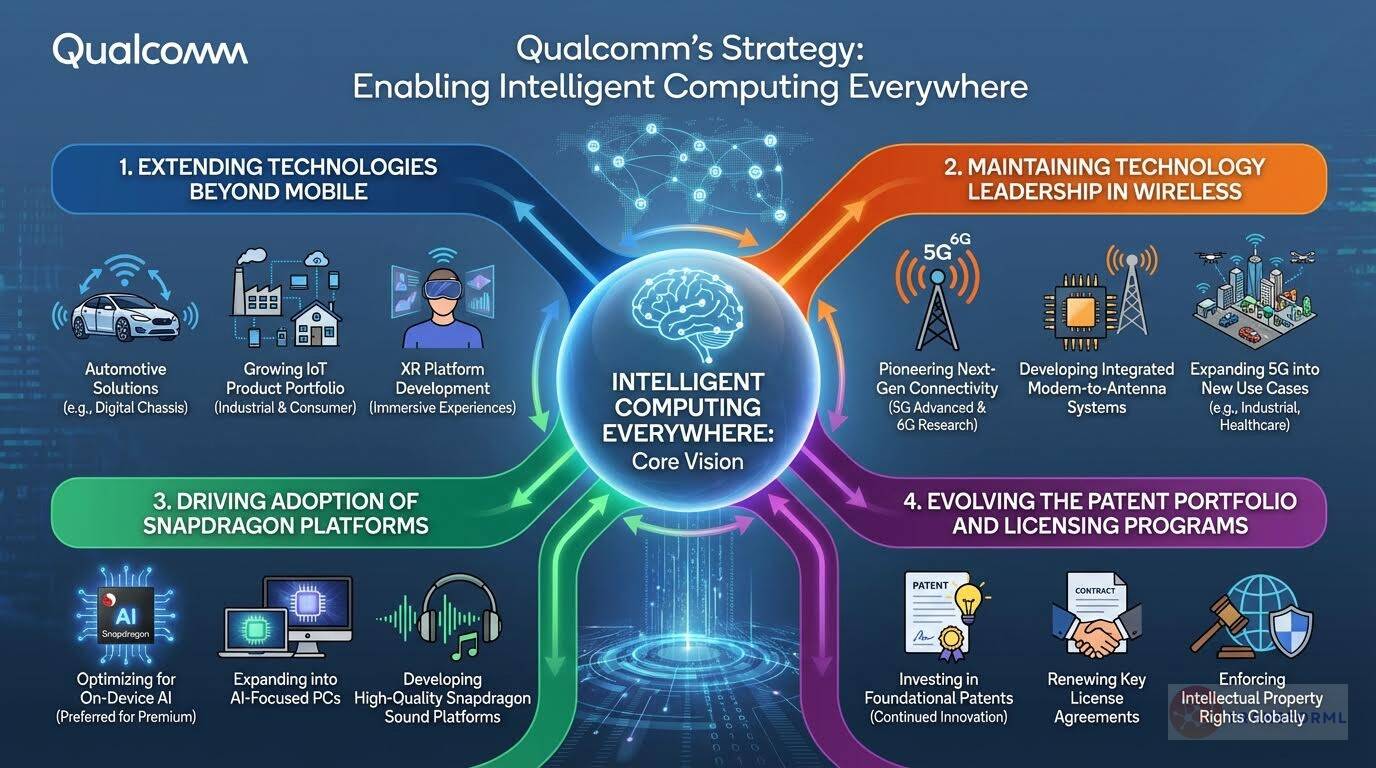QUALCOMM Incorporated Strategy Analysis

Editor-reviewed by Ahmad Zaidi based on analysis by TransforML's proprietary AI
CEO, TransforML Platforms Inc. | Former Partner, McKinsey & Company
Strategy overview for QUALCOMM Incorporated
QUALCOMM Incorporated is a global technology leader focused on developing and commercializing foundational technologies, including 3G, 4G, and 5G wireless connectivity, high-performance and low-power computing, and on-device artificial intelligence. The company is scaling its innovations across industries beyond mobile handsets, driving digital transformation in areas like automotive and the Internet of Things (IoT). QUALCOMM derives revenue from sales of integrated circuit products and licensing of its intellectual property.

Key Competitors for QUALCOMM Incorporated
Broadcom
Diverse product portfolio and strong market presence
MediaTek
Cost-effective solutions and strong presence in emerging markets
Samsung
Vertical integration and significant R&D investments
Nvidia
Leading GPU technology and expanding presence in automotive and AI
Apple
Strong brand recognition and in-house chip design capabilities
Insights from QUALCOMM Incorporated's strategy and competitive advantages
What Stands Out in QUALCOMM Incorporated strategy
QUALCOMM's strategy is uniquely distinguished by its dual-pronged business model, combining a high-margin intellectual property licensing arm (QTL) with a fabless semiconductor product division (QCT). This structure, rooted in foundational wireless patents (3G/4G/5G), provides a stable, high-margin revenue stream that competitors lack. While competitors like Broadcom also have extensive IP, QUALCOMM's model of licensing essential cellular standards is a core, defining feature.
This mobile-first heritage gives QUALCOMM deep expertise in low-power, high-performance integrated systems, exemplified by its 'Snapdragon' platform. This focus on power efficiency is a key differentiator as it expands into new verticals like AI-PCs ('Expand Snapdragon into AI-Focused PCs'), a market where competitors like NVIDIA and AMD originate from a high-power desktop and data center background.
Furthermore, QUALCOMM's strategy is fundamentally centered on holistic connectivity solutions, from 'modem-to-antenna' systems to automotive C-V2X, making connectivity its core value proposition rather than just a feature.
What are the challenges facing QUALCOMM Incorporated to achieve their strategy
QUALCOMM faces significant challenges in its strategic push for diversification, particularly in the lucrative data center AI market. While its vision is 'enabling intelligent computing everywhere,' its strategy appears less aggressive and defined in the high-performance computing (HPC) and data center AI training space compared to its rivals.
NVIDIA is the clear leader with its dominant, full-stack CUDA ecosystem and a relentless roadmap ('Develop Blackwell Architecture'), while AMD is positioning itself as the primary open alternative with its Instinct accelerators and ROCm software stack ('Execute multi-year roadmap of AMD Instinct accelerators'). QUALCOMM's strength is in on-device AI, but it lacks a comparable data-center-scale AI software ecosystem, which is a major hurdle for capturing this high-growth market.
Secondly, its expansion into automotive and PCs ('Extend Technologies Beyond Mobile Handsets') places it in direct, fierce competition with entrenched and aggressive players. In automotive, NVIDIA's DRIVE platform is a formidable competitor for autonomous driving compute, and in PCs, both AMD and Intel have deep-rooted incumbency and established software ecosystems that QUALCOMM's Snapdragon must overcome. Finally, its reliance on the QTL licensing model, while distinctive, is a point of vulnerability due to ongoing regulatory pressures and the risk of major customers like Apple bringing chip design in-house.
What Positions QUALCOMM Incorporated to win
Technology Leadership
- QUALCOMM possesses a leading intellectual property portfolio related to foundational technologies for the wireless industry, including 3G, 4G, and 5G. It continues to evolve its patent portfolio, particularly in 5G and next-generation technologies, and has an extensive portfolio of United States and foreign patents.
Market Position in Semiconductors
- QUALCOMM CDMA Technologies (QCT) is a leading developer and supplier of integrated circuit products and system software with advanced connectivity and high-performance, low-power computing technologies. Its Snapdragon family of solutions is widely used in mobile devices, automotive systems, and IoT devices.
Licensing Business Model
- QUALCOMM Technology Licensing (QTL) grants licenses to use portions of its intellectual property portfolio, which includes patent rights essential to and/or useful in the manufacture, sale, and/or use of certain wireless products. The company has licensed or otherwise provided rights to use its patents to hundreds of companies on industry-accepted terms.
Strategic Investments
- QUALCOMM Strategic Initiatives (QSI) makes strategic investments primarily through Qualcomm Ventures, focused on expanding or opening new opportunities for its technologies and supporting the design and introduction of new products and services. These investments are in early-stage companies in a variety of industries and applications, including 5G, AI, automotive, consumer, enterprise, cloud, IoT, and XR.
Strong Financial Performance
- QUALCOMM has demonstrated strong financial performance, with revenues of $39.0 billion in fiscal 2024, an increase of 9% compared to fiscal 2023. The company also has a strong cash position, with $13.3 billion in cash, cash equivalents, and marketable securities at September 29, 2024.
Commitment to Innovation
- QUALCOMM invests heavily in research and development to enhance existing products and technologies and to develop new products and technologies. The company has significant engineering resources and expertise in modem, radio-frequency integrated circuit, multimedia, sensor perception, advanced SoC, AI, and packaging technologies.
Fabless Production Model
- QUALCOMM primarily utilizes a fabless production model, which allows it to focus on design and development while relying on third-party suppliers for manufacturing and assembly. This model provides flexibility and scalability, although it also carries certain risks related to supply chain management.
Human Capital
- QUALCOMM has a highly educated and diverse global workforce, with approximately 49,000 full-time, part-time, and temporary workers at September 29, 2024. The company is committed to attracting and retaining top talent and provides robust compensation and benefits programs to meet the needs of its employees.
What's the winning aspiration for QUALCOMM Incorporated strategy
QUALCOMM aims to be the global leader in enabling intelligent computing across all industries by leveraging its foundational technologies in wireless connectivity, high-performance computing, and AI. It seeks to drive digital transformation and create a wirelessly connected, sustainable world.
Company Vision Statement:
Company Vision Statement - To bring intelligent computing everywhere through the development and commercialization of foundational technologies.
Where QUALCOMM Incorporated Plays Strategically
QUALCOMM competes in the mobile, automotive, and IoT markets, focusing on premium-tier devices and expanding into new and emerging regions. It leverages its existing technologies to penetrate adjacent industries and applications.
Key Strategic Areas:
How QUALCOMM Incorporated tries to Win Strategically
QUALCOMM wins by maintaining technology leadership, offering highly integrated and optimized solutions, and leveraging its intellectual property portfolio. It focuses on delivering superior performance, low power consumption, and advanced connectivity across its target markets.
Key Competitive Advantages:
Strategy Cascade for QUALCOMM Incorporated
Below is a strategy cascade for QUALCOMM Incorporated's strategy that has been formed through an outside-in analysis of publicly available data. Scroll down below the graphic to click on the arrows to expand each strategic pillar and see more details:
Related industry articles:
Extend Technologies Beyond Mobile Handsets
Expand Qualcomm's technologies and products into new and expanded product areas, industries, and applications beyond mobile handsets, such as automotive and IoT.
Develop Automotive Digital Chassis Solutions
Create and enhance Snapdragon Digital Chassis platforms, including connectivity, digital cockpit, and ADAS/AD, to connect cars to their environment and the cloud.
Expand IoT Product Portfolio
Develop and commercialize integrated circuit platforms and system software for consumer electronics, industrial devices, and edge networking products within the IoT sector.
Establish Strategic Partnerships in New Verticals
Forge collaborations with manufacturers, operators, developers, and system integrators in automotive and IoT to drive adoption of Qualcomm technologies.
Invest in XR Platform Development
Enhance XR platform features, such as 6DoF head tracking, video pass-through, and embedded cellular connectivity, to create new user experiences.
Maintain Technology Leadership in 5G and Next-Generation Wireless
Continue to develop and patent 5G and next-generation wireless technologies, and to develop and commercialize products using these technologies.
Advance 5G Advanced and 6G Research
Invest in research and development to drive advancements in 5G Advanced and establish requirements for 6G technologies.
Develop Integrated 5G Modem-RF Systems
Integrate Snapdragon platforms with RFFE components to create modem-to-antenna platforms that maximize data speeds and performance.
Expand 5G into New Use Cases
Develop technologies and products that expand 5G beyond mobile broadband into new use cases such as C-V2X, industrial IoT, and XR.
Contribute to 3GPP Standardization Activities
Actively participate in 3GPP standardization activities to define the evolution of 5G NR and 5G Core standards into 5G Advanced.
Drive Adoption of Snapdragon Platforms
Promote Qualcomm as the leader of enabling intelligent computing everywhere, and Snapdragon as the preferred platform brand powering premium experiences across handsets, automotive and IoT.
Enhance Snapdragon Brand Marketing
Implement direct marketing efforts, partnerships, and collaborations to promote Snapdragon as the preferred platform for premium experiences.
Optimize Snapdragon for On-Device AI
Develop and integrate the Qualcomm AI Engine, including the Hexagon NPU, to enable high-performance, low-power on-device AI capabilities.
Expand Snapdragon into AI-Focused PCs
Promote the adoption of Snapdragon X Series platforms in AI-focused PCs to enable increased productivity and enhanced use cases.
Develop Snapdragon Sound Platforms
Create and improve Snapdragon Sound platforms to deliver high-quality audio experiences in mobile devices and other applications.
Evolve Patent Portfolio and Licensing Programs
Continue to evolve the patent portfolio and renew or renegotiate license agreements that are expiring to ensure the continued success of licensing programs.
Invest in Foundational Technology Patents
Continue to invest in the acquisition and development of OFDMA technology and intellectual property to maintain a leading patent portfolio.
Renew Key License Agreements
Extend or modify existing license agreements with key licensees to ensure continued royalty revenues.
Enforce Intellectual Property Rights
Pursue litigation and other legal actions against companies that infringe on Qualcomm's patents.
Expand Patent Coverage Globally
Pursue patent applications in key markets, including Brazil, China, India, Japan, South Korea, Taiwan, the United States, and Europe.
Execute Supply Strategies for Assurance and Leadership
Execute supply strategies that provide supply assurance, technology leadership and reasonable margins, while managing order and shipment uncertainties.
Diversify Foundry Suppliers
Establish and maintain alternate suppliers for key products to mitigate risks associated with sole- or limited-source arrangements.
Secure Long-Term Capacity Commitments
Negotiate long-term capacity commitments with suppliers to ensure adequate manufacturing capacity for Qualcomm's products.
Improve Manufacturing Yields
Continuously modify manufacturing processes to improve yields and performance.
Optimize Inventory Management
Improve forecasting and inventory management to minimize excess or obsolete inventory.
Cultivate a Diverse and Inclusive Workforce
Attract and retain top talent by fostering a diverse, inclusive, and safe workplace with opportunities for growth and development.
Enhance Employee Network Programs
Support and expand employee networks focused on women, LGBTQ+ employees, employees with disabilities, and underrepresented populations.
Recruit Diverse Technical Talent
Recruit technical talent in diverse communities by engaging with professional conferences and colleges with diverse student populations.
Promote Health and Wellness Programs
Provide employees and their families with access to innovative health and wellness programs.
Expand Talent Development Opportunities
Deliver training opportunities, provide rotational assignment opportunities, and focus on continuous learning and development.
Strengthen Cybersecurity Posture
Maintain a robust cybersecurity program to protect IT systems, intellectual property, and proprietary information from security breaches and misappropriation.
Enhance Cybersecurity Threat Detection
Implement advanced security monitoring and threat intelligence capabilities to detect and respond to cybersecurity threats.
Conduct Penetration Testing and Tabletop Exercises
Periodically conduct penetration tests and tabletop exercises to validate the efficacy of security controls and response capabilities.
Improve Supplier Cybersecurity Assurance
Assess and mitigate potential cybersecurity risks across the supplier community through a supplier cybersecurity assurance program.
Remediate IT System Vulnerabilities
Identify and remediate vulnerabilities in IT systems and software to prevent exploitation by hackers.
Read more about industry strategies
Source and Disclaimer: This analysis is based on analysis of Annual reports for 2024. For informational purposes only (not investment, legal, or professional advice). Provided 'as is' without warranties. Trademarks and company names belong to their respective owners.
